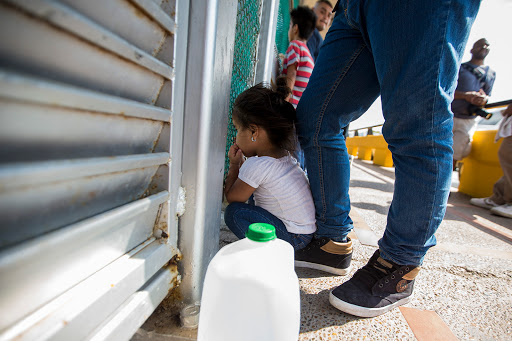While Immigration Policies Are Defined, Many Families Along The Southern Border Can Only Wait

A three-year-old from Honduras peers through a fence at the U.S. – Mexico border while her family waits to apply for asylum. Photo by Jesse Costa for WBUR
Brownsville, Texas, lies along the Rio Grande and the border of Mexico, nearly 2,000 miles from New England. Still, Democratic members of Congress from Massachusetts, Connecticut, Maine and New Hampshire all traveled to the border city this weekend. They said their offices were being flooded with phone calls from constituents, distraught over reports of migrant children separated from families.
President Trump has reversed his Administration’s policy of separating families. But as WBUR’s Shannon Dooling found as she traveled to the border, there is still a lot of confusion, distress, and waiting.
It’s a hot day in Brownsville, Texas. U.S. Rep. Chellie Pingree of Maine sits shotgun in a silver Mercedes SUV, talking to her driver, a Brownsville city official. She turns around, leaning over her left shoulder, and explains what it was like earlier in the day when she spoke with a group of migrant mothers in a nearby U.S. Immigration and Customs Enforcement (ICE) detention facility.
“That was the place where it was just truly confirmed in our conversations with the women who were being held there that they didn’t know where their children were, they didn’t have a chance to communicate with them, they didn’t understand, before their children were being taken, that their children were being taken away,” she says.
Pingree is part of a Democratic delegation that includes members of Congress from Massachusetts, Connecticut, Maine and New Hampshire who traveled down to Brownsville, which lies along the Rio Grande and the border of Mexico. They were there to see for themselves the results of President Trump’s back-and-forth on families crossing the U.S.-Mexico border.
They all say their constituents, distraught over reports of children separated from families at the border, are flooding their offices with phone calls.
While Trump last week reversed his administration’s policy on separating families, there is still a lot of confusion, distress and waiting.
The women Pingree talked to were waiting behind barbed wire, she says.
“That was gut wrenching,” she says. “I mean, that was me and my colleagues in tears with a lot of women in tears, you know, trying to say, ‘We want to do something to help.’ “
We head out to the nearby border crossing. Pingree wants to see the asylum process with her own eyes after hearing reports of people being turned away, sometimes instructed to come back later.
“We hear stories about people sitting there for days on end with their families, it could be raining, it could be this oppressive heat; they can’t leave,” she says. “Border Patrol told us that women can be raped, they can be beaten, there can be all kinds of horrible things that can happen if you leave that position so to say to people, ‘Well, you know, just get up and wait.’ It’s not like that.”
